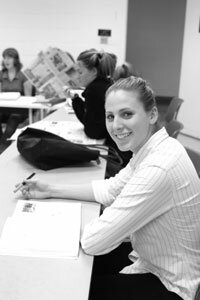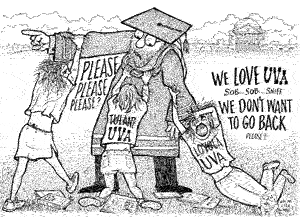Visit over?: Tulane beckons, students balk
In late August, UVA welcomed them with open arms: more than 150 university students, many of them freshman, displaced from their Gulf Coast schools by Hurricane Katrina. Now, after a semester as "visiting students," taking classes and making friends, some of those students want to remain at UVA. But the welcome mat, it seems, is no longer out.
"We're here, we're settled in, we love it, and we want to stay," says Stephanie Swisher, who started her first year in college at Tulane in August– only to be evacuated from New Orleans and forced to leave her belongings in her dorm room just before the mega-storm hit.
UVA's student council agreed that Swisher and several other first-years should be allowed to apply as mid-year transfer students. On November 1– deadline day for transfer applications– council unanimously passed a resolution asking that UVA make an exception to its rule requiring transfer students to have completed two semesters of college work.
"This is the university that they call home," says student council rep Catherine Tobin. "We're not asking for guaranteed admission, but they should be given the chance."
But UVA administrators say the offer UVA made to the refugee students– to come for one semester, tuition free– is the one that stands.
"When they arrived in late August, I gave them a letter saying 'We're glad you could be here, you're coming as a visiting student for one semester,'" says Dean of Admissions John Blackburn. "If their school reopens, we expect them to return." At press time, Tulane, Loyola, Dillard, and Xavier in New Orleans had publicly announced plans to reopen in January.
To Swisher, UVA's transfer policy seems "kind of unfair."
Though Blackburn says transferring mid-year into UVA is highly competitiveas many as 300 students compete for "25 or 30" spots– Swisher says she and her fellow Tulane students deserve special consideration.
"We feel like we should have the upper hand because we are students at UVA right now," she says, citing her involvement in UVA's intramural basketball league and the A's she's earning in her classes. "They don't have to predict anything about us," she says.
Imagining herself back at Tulane, she sighs. "I applied mostly for the city and surroundings," she says, "and it's not the same as when I applied."
If UVA won't let her apply to transfer, Swisher, a Richmond native, fears she and other students will be forced to return to Tulane, where she'll then begin planning to transfer somewhere else.
"We're going to be frustrated, unhappy, and far from home," she says. "We'll spend a semester in a new place and then get uprooted again."
Blackburn says he understands displaced students'– and their parents' concerns, but he believes UVA has an obligation to the colleges from which these students came.
"It could be the death knell for some of these schools if they don't get their students back," he says, citing layoffs at Gulf Coast schools including Loyola and Tulane. "If we keep some students here, we may be severely criticized by national organizations."
Though the student council resolution was unanimously supportive of the Tulane students, the Cavalier Daily's lead editorial on November 3 backed Blackburn's position.
"UVA and all colleges and universities with visiting students from the Gulf Coast and New Orleans must not bend their rules for visiting students until they meet the requirements for transferring," the paper said, citing fairness to other prospective transfer students as well as the needs of the Gulf Coast schools. "The last act of generosity we can take is to give the stricken schools their students back."
Tulane is clearly looking on the bright side and hoping students will return.
"Anecdotally, the vast majority of students have indicated that they're going to return," says Tulane spokesman Mike Strecker, who guesses as many as 90 percent of students will come back. In early November, the school began hosting students who returned for a visit to see the campus and speak to administrators about the school's future.
"We think students should do that before they make a decision," says Strecker, pointing out that through his own office window on Tulane's campus, "it doesn't look like anything ever happened."
Swisher, who traveled to New Orleans the first weekend in November to see the campus and retrieve belongings, says the school is still undergoing repair, including mold treatment in her dorm. But she expects all the buildings to be ready when classes resume January 17. She listened to a speech by Tulane President Scott Cowen and spoke with many professors. Even so, she didn't change her mind about returning to the Crescent City.
"All the big buildings are fine, but I still want to transfer," she says. Of UVA, she adds, "This is what I know, and what I like. I'm comfortable here."
Swisher says she's hoping Dean Blackburn will have a change of heart and consider her transfer application, which she was completing at Hook press time. If he doesn't, she and other students will have another chance to apply next fall, after they've met the coursework requirements.
At that point, "We will consider them fairly, like any other student," says Milton Adams, vice provost for academic programs at UVA, who coordinated the students' arrival and adjustment at the beginning of the semester.
"I think everyone is really wishing the best for the institutions in New Orleans and the city to recover," says Adams. "It's been traumatic for everyone involved, and I'm happy we could to the little bit we did to host the students here."

Stephanie Swisher hopes to stay at UVA.
PHOTO BY JEN FARIELLO
